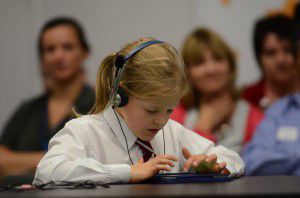Why Russian? Why not?
Lucy was our first ever winner of the Junior Language Challenge and at age 23 has now chosen to take part in the uTalk Challenge learning Russian. Lucy already speaks Spanish, French, Italian, German and Latin and has been learning languages since she was 10 years old.
Why? Why not?
I was talking to some friends at work at the beginning of January, and it came up in conversation that I was learning Russian. ‘Why Russian!?’ one said. ‘Why not?’ was my reply. People are often surprised when I say that I love learning languages. I think to them, it seems a little removed from what I normally do (I work in science). And while I may have decided to work in science instead of languages, that doesn’t mean to say that they aren’t useful to me.
When I was about 10, a teacher from the local secondary school came to teach us Spanish once a week, and I thought it was brilliant! My teacher entered some of our class into the first ever EuroTalk Junior Language Challenge; being able to learn three different languages was even more exciting. Spanish, Greek (my first experience of a language with a different alphabet), and Saami – Santa’s language (northern Finland, to be exact). Taking part showed me that language learning was fun, and set me on a course of lifelong linguistics.
I’d describe myself as a patchwork of languages; I can speak each to a different level, ranging from Italian, my speaking is poor but my translation is decent, to Spanish, where I can happily hold a conversation. My latest is Russian, which I’ve always wanted to learn; I’ve just about got to grips with the Cyrillic alphabet. It’s fun to learn so many languages, it stretches my brain, and I love the feeling of being able to speak to someone in their native tongue, a mixture of pride and respect for their culture. However, that doesn’t mean to say that I don’t have problems! The use of the subjunctive in Spanish will forever escape me (in English we only use it in one specific way, when we say ‘If I were you…’), and those odd little verbs in every language that don’t follow the rules always hide away in the recesses of my mind when I want to use them.
How do I overcome problems? Practice! Practice speaking with others out loud, using odd verbs and new tenses and reading with literature from your chosen language starting with children’s stories and building it up (good for new vocabulary and surprisingly complex!) If you are learning more than one, try to compartmentalise them in your head; have a Spanish head and a French head. My Latin is extremely handy for any new scientific terms, I usually have a guess at what they mean before looking them up. My other languages are great for holidays, trips with work and just keeping my brain active. I certainly don’t intend to stop (I think I may try Basque next): you never know when you might need them!
Languages at primary school – what’s the point?
From September this year, it’s going to be compulsory for primary schools in the UK to teach a foreign language. This is causing quite a lot of stress for schools, according to a report published earlier this week, which says that 29% of teachers don’t feel confident about teaching a language to their students. That’s hardly surprising, considering many teachers haven’t studied languages themselves since their GCSEs, which for some will have been quite a while ago.
But despite this, the report says, 85% of primary schools have said they believe making languages a requirement is a good move, and many are already tackling the situation head on by introducing languages before it’s required by law.
 So what exactly is the point of teaching languages at such a young age? Many people will argue that the curriculum for children is already too full, with a need for English, maths and science, as well as citizenship, history and physical education, to name just a few. Why squeeze in yet another subject, especially in a world where many people believe that ‘everyone speaks English’?
So what exactly is the point of teaching languages at such a young age? Many people will argue that the curriculum for children is already too full, with a need for English, maths and science, as well as citizenship, history and physical education, to name just a few. Why squeeze in yet another subject, especially in a world where many people believe that ‘everyone speaks English’?
Learning a language is good for your brain
Well firstly, learning a language can actually make you smarter. The positive effects are well documented – bilingualism makes you better at problem solving, planning and verbal reasoning. Research by psychologists at Penn State University has shown that if you’re bilingual, you’re likely to be better at multi-tasking, because your brain is used to ‘mental juggling’. And other studies have shown that learning another language can help to delay the onset of dementia in later life.
It makes you better at your native language
Studying a second language helps you to understand your own, because it makes you think about how language is formed. Because I grew up speaking English, I don’t really remember learning the rules of the language; they just came naturally. But when I took up Spanish, suddenly I needed to think about grammar, and about how I was structuring sentences, which is much more important in Spanish than in English. For example, in Spanish you can’t end a sentence with a preposition, which made me realise how often I was getting away with this in English. And I would never have even known the subjunctive existed if not for my Spanish studies (although I’m not going to lie and say I use the subjunctive regularly in English!).
Learning a language prepares you for the rest of your life
I don’t just mean learning languages at secondary school, although it’s likely that children who leave primary school with some knowledge of another language will want to continue it when they move on. I mean beyond school – when the time comes to choose degree courses and, even more importantly, find a job. A recent article in The Economist says that employees with a language in the U.S. can earn on average 2% extra, which may not sound like much, but over time can add up to some serious money. Not only that but learning a language will make it easier for you people to go travelling and see the world; it might even help you find the love of your life!
The younger, the better
It’s a common argument that children are better at learning languages than adults; because of the way the brain develops, some scientists believe there’s a ‘critical period‘ for language acquisition. And although there’s plenty of evidence that this might not necessarily be the case (just look at Benny Lewis, who didn’t start learning languages until adulthood, and now speaks twelve languages fluently), I do think there’s something in it; after all children are constantly learning new things, so one more probably won’t phase them. And they’re also in a better position to learn than adults, who are very good at finding other things to do and worry about. (I know I am.)
It’s fun!
Some people might disagree with me here, looking back on their own language classes at school with its endless repetition of vocabulary and verb conjugations. Obviously I’m biased, but I do think learning to speak another language can be really fun if it’s put across in the right way. There are so many exciting ways to teach a language, from songs and TV shows to games and apps. The internet is full of great ideas – have a look at #mfltwitterati on Twitter as a good starting point.
Or check out the Junior Language Challenge, EuroTalk’s national competition for children aged 10 and under across the UK – it’s great fun for children, makes life easy for teachers and raises money for charity all at the same time. Just the other day we received a message from one of our 2013 finalists, who said, ‘It was a great adventure. It’s now set me off to learning languages from all over the world.’
Liz


